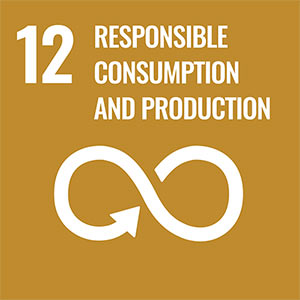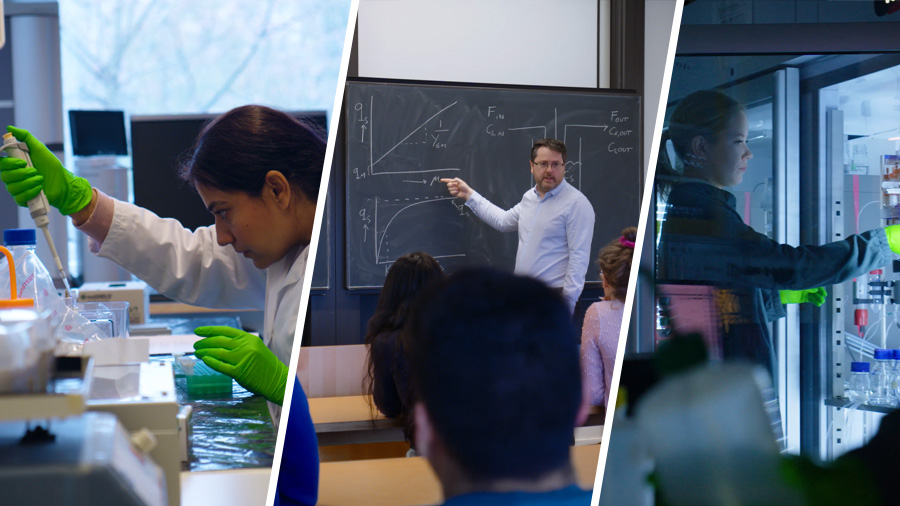MSc Industrial and Environmental Biotechnology
The master's programme in Industrial and Environmental Biotechnology provides a deep understanding of how to design and operate state-of-the-art life science-based processes with respect to product quality, sustainability and finance. Graduates have the competencies and skills to use cells, cell components and biomolecules to produce commodities such as chemicals, food, biofuels, clean water or soil and biomaterials for the development of a sustainable society.
Industrial and Environmental Biotechnology at KTH
The two-year programme comprises advanced courses regarding biotechnological tools used for developing industrial processes, sustainable production of commodities and the impact of such operations on the environment and society. The education provided is based on our world-leading research at KTH, is comprehensive and prepares you for future careers in Sweden or internationally in the private and public sectors.
The programme offers three tracks to provide specialisation within a particular industrial biotechnology field: cell-based process biotechnology, enzyme technology and environmental biotechnology. You can tailor your education by choosing one track and complementing it with courses from other tracks or biotechnology courses from other master's programmes. It is also possible to cherry-pick courses from any track to create your unique professional profile.
Courses contain both theoretical knowledge and practical applications on topics ranging from fundamental science, experimental design, production, analysis and life cycle assessment. The curriculum provides a cross-platform approach to enable you to acquire unique and individualised expertise that appeals to many employers. You train problem-solving skills, project management as well as professional communication. During the last semester of the programme, you work on a master's degree project in a research setting at KTH, in industry or in a university or research institute anywhere in the world to acquire specialisation within a relevant topic.
The programme curriculum is designed, taught and continuously updated by a team of internationally recognised professors and researchers within the different subject areas, in collaboration with representatives from the private sector. The programme is given by the School of Engineering Sciences in Chemistry, Biotechnology and Health in Stockholm with access to facilities, infrastructure and instrument park available at the KTH Campus in Stockholm at AlbaNova University Center.
Courses in the programme
Courses in the programme Industrial and Environmental Biotechnology
Future and career
Graduates of the programme will acquire the skills necessary for a professional career in the biotechnology industry or further academic studies. The Industrial Biotechnology sector is expanding worldwide, offering anyone with a master’s degree in Industrial and Environmental Biotechnology vast career opportunities within the manufacturing of bioproducts or equipment, research and development, biotechnological services, including those found in patent and consultant agencies, research policy, journalism and finances. Graduates work as research scientists, field application specialists, QC scientists, project managers, science communicators, laboratory managers, operation developers, sales representatives, patent analysts and research associates.
Many graduates from the programme go on to PhD studies at KTH or other prominent technical university, including Karolinska Institute, University of Copenhagen, Université de Lausanne, TU Darmstadt and Taipei Medical University.
Sustainable development
Graduates from KTH have the knowledge and the necessary tools to contribute to the transition to a sustainable society. Sustainable development is an integral part of all programmes. The Industrial Biotechnology sector is considered one of the leading players in current and future societal challenges. The courses focus on topics related to most of the 17 sustainable development goals. The master's programme in Industrial and Environmental Biotechnology prepares you for careers focusing on developing more effective and environmentally friendly production of commodities. The three key sustainable development goals that are best aligned with the master's programme in Industrial and Environmental Biotechnology are:


The programme provides knowledge and understanding about how biological processes and cellular components can create new technologies, industrial processes and biotechnological products. You learn how to apply microorganisms to remove contaminants from water and soil or to produce biomolecules or chemical products. You will also explore how to use microorganisms or enzymes to design and create effective and sustainable production of products ranging from food ingredients to detergents, paper, drugs and textiles. Sustainability is an essential aspect of Industrial and Environmental Biotechnology and continuously combines science and technology to improve, simplify or streamline industrial or environmental production or services.
Faculty and research
The master's programme in Industrial and Environmental Biotechnology is offered at the School of Engineering Sciences in Chemistry, Biotechnology and Health and is heavily based on the research performed at AlbaNova University Centre.
KTH departments involved in the programme
The scientists from the School of Engineering Sciences in Chemistry, Biotechnology and Health that teach in the programme belong mainly to one of the three departments Industrial Biotechnology, Chemistry, or Protein Science. The courses in the programme cover the research conducted at KTH in both fundamental and applied sciences, reflecting the multidisciplinary nature of Industrial and Environmental Biotechnology.
Research activities include protein technology and engineering, process biotechnology and bioconversion, biocatalysis, structural enzymology and enzyme engineering, metabolic engineering, pharmaceutical production, clean water, resource recovery, synthetic biology, bioremediation, carbohydrate material engineering and bioenergy production. Researchers are internationally recognised and collaborate with leading international research groups and companies within the industrial biotechnology sector.
Faculty involved in the programme
The programme is organised in three study tracks with many scientists involved in each track.



